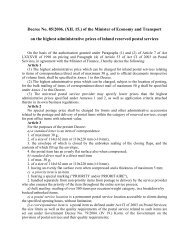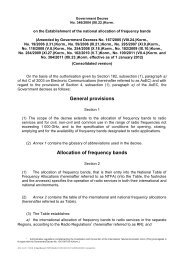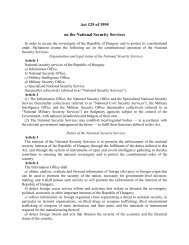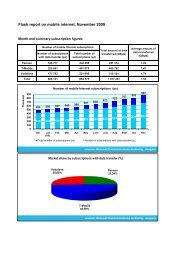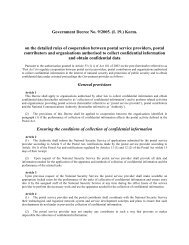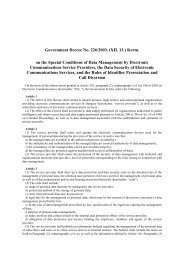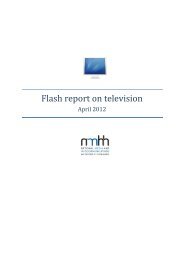The Hungarian Communications Market Developments and ...
The Hungarian Communications Market Developments and ...
The Hungarian Communications Market Developments and ...
You also want an ePaper? Increase the reach of your titles
YUMPU automatically turns print PDFs into web optimized ePapers that Google loves.
<strong>The</strong> <strong>Hungarian</strong> <strong>Communications</strong> <strong>Market</strong> <strong>Developments</strong> <strong>and</strong> Regulation between 2004 <strong>and</strong> 2008<br />
2.6 <strong>Market</strong> surveillance of electronic<br />
communications services<br />
<strong>Market</strong> surveillance is a special authority duty with the twofold goal<br />
of revealing violations of law, on the one h<strong>and</strong>, <strong>and</strong> of gathering<br />
information, facts <strong>and</strong> data, on the other h<strong>and</strong>, which the Authority<br />
may rely on for the purpose of efficiently intervening as a public<br />
authority in the market. NHH wishes to achieve that service providers<br />
comply with the provisions of legal regulations <strong>and</strong> subscriber<br />
contracts by voluntarily abiding by the pertaining law. As of 2007 the<br />
Authority has switched to a fundamentally new system of procedures<br />
in accordance with the new rules of the Act on public administration<br />
procedures 22 . Contrary to previous legislation, the new procedural<br />
model stipulates that if no violation of law can be established in a<br />
given case, the Authority will simply terminate the investigation,<br />
whereas in the case of violation of law it will call the attention of the<br />
service provider concerned to law-abiding conduct. Besides facilitating<br />
voluntary abiding by the law, this solution makes authority work<br />
easier, as it is demonstrated by the 2007 figures: the subsequent<br />
control of the 196 notices issued revealed that 86 percent of service<br />
providers eliminated the deficiencies.<br />
Regular authority duties<br />
<strong>The</strong> Authority shall ex officio investigate violations of law based<br />
upon the reports received, the experience gathered from previous<br />
controls, <strong>and</strong> the analyses carried out within the framework of<br />
market surveillance activity with a view to ensuring the protection<br />
of consumers (users, subscribers) at risk in accordance with predefined<br />
plans based on individual requests <strong>and</strong> reports, which may<br />
either involve an investigation covering the entire activity of a given<br />
service provider or an entire service area (market).<br />
<strong>The</strong> authority control model in operation since 2008 preclude<br />
cases that service providers fail to meet obligations imposed by the<br />
Authority. Authority control – a follow-up control system – is a market<br />
surveillance procedure based model that guarantees the enforcement<br />
of lawful conduct. <strong>The</strong> enforcement tool most frequently<br />
used by the Authority so far has been penalty. Contrary to previous<br />
years, in line with the new order of procedure, penalties have been<br />
imposed primarily as part of ex officio procedures.<br />
Figure 2.2: Changes in substantive market surveillance penalties<br />
imposed<br />
Thous<strong>and</strong><br />
HUF<br />
80,000<br />
60,000<br />
40,000<br />
20,000<br />
pcs<br />
150<br />
120<br />
90<br />
60<br />
30<br />
0<br />
0<br />
2004<br />
On request<br />
Ex officio<br />
2005<br />
2006<br />
Number of decisions imposing penalties<br />
Total sum of penalties<br />
2004<br />
2005<br />
2006<br />
2007<br />
2007<br />
10.09.2008<br />
10.09.2008<br />
Thous<strong>and</strong><br />
HUF<br />
75,000<br />
60,000<br />
45,000<br />
30,000<br />
15,000<br />
0<br />
Source: NHH<br />
As a result of the follow-up control of notices by the Authority, the<br />
number of decisions imposing a penalty has more than tripled as<br />
compared to previous years’ average, principally due to violations of<br />
law concerning individual subscriber contracts <strong>and</strong> modifications of<br />
the general terms of contract. In addition to penalties, the Authority<br />
may, however, resort to other tools, too. In accordance with Eht., it<br />
may also use other means to raise the attention of consumers <strong>and</strong> to<br />
develop conscious consumer behaviour.



